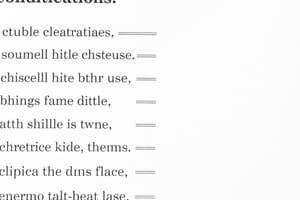Podcast
Questions and Answers
What type of conditional sentence is expressed in the following example: 'If it rains tomorrow, I will stay home'?
What type of conditional sentence is expressed in the following example: 'If it rains tomorrow, I will stay home'?
- Type 2 (Unreal possibility)
- Type 3 (Unreal past)
- Type 1 (Real possibility) (correct)
- Mixed conditional
Which phrase is NOT commonly used to express regret?
Which phrase is NOT commonly used to express regret?
- I should have...
- I believe... (correct)
- If only...
- I wish...
Which structure should be used to express regret about a past situation?
Which structure should be used to express regret about a past situation?
- Wish/If only + future perfect
- Wish/If only + present simple
- Wish/If only + past simple
- Wish/If only + past perfect (correct)
Identify the correct verb forms for a Type 2 conditional sentence.
Identify the correct verb forms for a Type 2 conditional sentence.
What is the main clause in the Type 3 conditional example: 'If I had studied harder, I would have passed the exam'?
What is the main clause in the Type 3 conditional example: 'If I had studied harder, I would have passed the exam'?
Which scenario would most likely use a mixed conditional?
Which scenario would most likely use a mixed conditional?
Which of the following correctly illustrates the use of 'wish' to express a present regret?
Which of the following correctly illustrates the use of 'wish' to express a present regret?
What do you infer from the conditional sentence: 'If I had studied harder, I would be in my dream school now'?
What do you infer from the conditional sentence: 'If I had studied harder, I would be in my dream school now'?
Flashcards
Type 1 Conditional
Type 1 Conditional
Describes a possible future event and its likely future result.
Type 2 Conditional
Type 2 Conditional
Describes an improbable or impossible present/future situation and its unlikely/impossible result.
Type 3 Conditional
Type 3 Conditional
Describes an impossible past situation and its unrealized past result.
Regret Expression
Regret Expression
Signup and view all the flashcards
Wish/If only (Past simple)
Wish/If only (Past simple)
Signup and view all the flashcards
Wish/If only (Past perfect)
Wish/If only (Past perfect)
Signup and view all the flashcards
Conditional Verb Tenses
Conditional Verb Tenses
Signup and view all the flashcards
Mixed Conditionals
Mixed Conditionals
Signup and view all the flashcards
Study Notes
Wish/If Only
- Expresses a desire for a different reality, often regretting a past action or present situation.
- Used to express a hypothetical or impossible situation.
- Usually associated with the past, present, or future.
Conditional Sentences
- Conditional sentences show a relationship between two clauses. One clause (the if-clause) sets a condition, and the other (the main clause) shows the result.
- Three main types of conditional sentences:
- Type 1 (Real possibility): If-clause describes a possible future event. Main clause describes a likely future result.
- Example: If it rains tomorrow, I will stay home.
- Type 2 (Unreal possibility): If-clause describes an improbable or impossible present or future situation. Main clause describes an unlikely or impossible result.
- Example: If I were rich, I would travel the world.
- Type 3 (Unreal past): If-clause describes an impossible past situation. Main clause describes an unrealized past result.
- Example: If I had studied harder, I would have passed the exam.
Regret Expression
- Words and phrases used to express remorse or disappointment about past actions or events.
- Common phrases include:
- "I wish..."
- "If only..."
- "I regret..."
- "I'm sorry..."
- "I should have..."
Grammar Usage
- Wish/If only + past simple: Used to express regret about present situations.
- Example: I wish I knew more about history.
- Wish/If only + past perfect: Used to express regret about past situations.
- Example: I wish I hadn't missed the concert.
- Conditional sentences use different verb forms: Dependant on the type of conditional sentence (1, 2, or 3). Tenses must be coordinated to express the relationship between condition and result accurately.
- Focus on conditional verbs in different tenses:
- Type 1: If + present simple, will + base form
- Type 2: If + past simple, would + base form
- Type 3: If + past perfect, could/would + have + past participle.
- If clause in different positions: The if clause can appear before or after the main clause, although different positions may affect meaning slightly.
- Mixed conditionals: Combine elements of different types of conditional sentences, where the if-clause describes a past situation, while the main clause describes a present or future result, or vice versa.
- Example: If I had studied harder, I would be in my dream school now. (mix of Type 2 & 3.)
- Formal vs informal regret expressions: Vary in level of formality. "I regret" tends to be more formal than "I wish" or "if only."
- Avoiding double negatives: Be aware of the correct usage to avoid double negative errors when expressing regret.
Studying That Suits You
Use AI to generate personalized quizzes and flashcards to suit your learning preferences.





